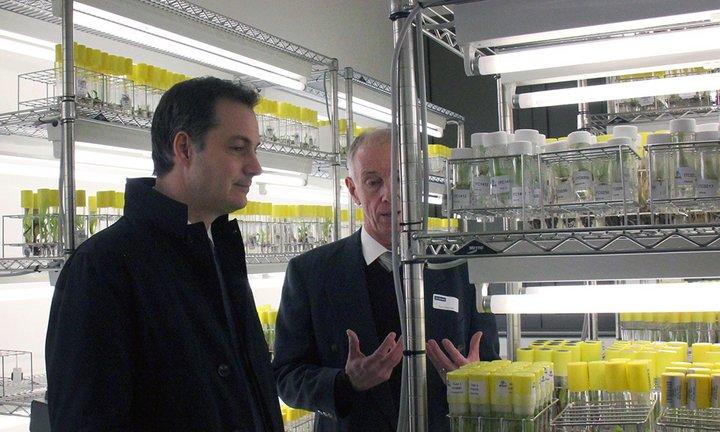Belgium renews strong support to Bioversity International’s banana research

In September, the Belgian Government has strongly committed to support Bioversity International’s banana research activities that contribute to current and future food and nutrition security and enhance farmers’ options as entrepreneurs.
In September, the Belgian Government, through its Directorate-General for Development, has strongly committed to support Bioversity International’s research activities in banana farming systems that contribute to current and future food and nutrition security, and enhance farmers’ options as entrepreneurs.
On 5 September 2017, the Government of Belgium, through the Federal Public Service Foreign Affairs, Foreign Trade and Development Cooperation – Directorate-General for Development (DGD), has committed to strongly support CGIAR and Bioversity International research for 2017–2020.
In particular, DGD is supporting Bioversity International’s banana research activities that contribute to current and future food security. Banana is the fourth most important crop in the Least Developed Countries, providing food, nutrition and income for hundreds of millions of people.
In Belgium, Bioversity International maintains the world’s largest collection of banana diversity, hosted by the Catholic University of Leuven (KU Leuven). Known as the Bioversity International Musa Transit Centre (or ITC), the collection contains more than 1,500 samples of edible and wild species of banana coming from all over the world. Safeguarding banana diversity is critical to make banana farming more nutritious, productive and resilient.
In January 2017, while visiting the ITC for its 30th anniversary celebrations, Alexander De Croo, Minister of Development Cooperation, said: “I am very impressed with the work being done at the ITC. The Belgian Development Cooperation has been supporting the genebank for decades and I look forward to continuing this successful collaboration.”
“This commitment from Belgium is vital to continue critical research on bananas that will contribute to make our world more food secure for millions of people,” said M. Ann Tutwiler, Bioversity International’s Director General.
For the next four years, DGD has committed to support two very important areas of research carried out at the ITC.
The first area is cryopreservation, and the ITC’s contribution to advance the state of the art of plant cryopreservation in the world.
Cryopreservation is a process that allows the conservation of plant materials for thousands of years in liquid nitrogen, at -196°C. This technique is vital to safeguard, in the long term, all those crops that cannot be conserved through their seeds, like bananas, cassava, taro and many others.
Bioversity International and KU Leuven are global leaders in plant cryopreservation, with more than 25 years of experience. Bioversity International has developed procedures for the cryopreservation of 30 plant species – including, apple, banana, tomato and many more, and provided extensive training to scores of researchers.
Thanks to Belgium’s 4-year commitment, Bioversity International and KU Leuven will be able to develop and optimize cryopreservation protocols for important crops, such as many tropical fruits, and train technicians and researchers from developing countries on cryopreservation.
The second crucial important area of work supported by Belgium is about identifying drought-tolerant bananas for the African Great Lakes region.
It is estimated that globally drought stress causes yield losses of 37–61 million tonnes annually, worth at least US$13–22 billion, with a third of these losses happening in Africa. Climate change is expected to reduce annual rainfall, potentially causing even higher losses; and predicted increases in temperature will also further increase the crop’s water demand by an estimated 12–15%.
Bananas are particularly important for livelihoods and food security in the African Great Lakes region. Millions of growers and their communities will benefit significantly from introducing higher-yielding ‘climate-smart’ banana varieties that demonstrate high water-use efficiency and do not suffer appreciable yield losses.
Using advanced molecular techniques and analyzing a large amount of data coming from experiments in the field, greenhouse and growth chamber*, researchers from Bioversity International and KU Leuven will explore the genetic diversity of bananas conserved at the ITC to understand their response to drought, and identify drought-tolerant varieties.
In associated work in the Great Lakes Region, Bioversity International will work with the Consortium for Improving Agricultural Livelihoods in Central Africa (CIALCA), also supported by Belgium. Led by the International Institute of Tropical Agriculture (IITA), CIALCA has a strong track record of research for development in Rwanda, Burundi and the Democratic Republic of the Congo.
DGD’s support will help to catalyze CIALCA’s partnerships, capacity building and research services towards more options and innovations for entrepreneurial farming. CIALCA’s unique systems approach starts from the demand side, and is able to anticipate and act upon interactions between productivity improvement, environmental sustainability, gender equity, nutrition security and income generation in complex banana- and cassava-based agri-food systems and societies. These interactions are critical to scale promising agricultural technologies such as improved banana varieties.
*Experiments in the field will be carried out with the International Institute of Tropical Agriculture (IITA), and experiments in the greenhouse and growth chamber with KU Leuven.
_____________
Photo: Belgium Deputy Prime Minister and Minister for Development Cooperation, Alexander De Croo, visiting Bioversity International's banana genebank hosted at the Catholic University of Leuven (KU Leuven). Credit: Bioversity International/N.Capozio
